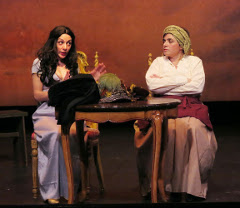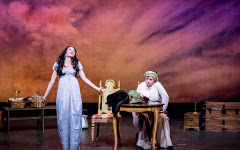Franca Valeri's play using
a "Tosca" backdrop is sharp, current.
"Tosca e le Altre Due" ("Tosca" and
the Two Downstairs)
March 20 to March 30
Dicapo Opera, 184 E 76th Street, Manhattan (between Third Ave. and
Lexington)
Presented by Kairos Italy Theater www.kittheater.com and Dicapo
Opera
Thursdays through Saturdays at 8:00 pm, Sundays at 2:00 pm
$35.00 general admission; Box Office (212) 868-4444, www.smarttix.com
Reviewed by Carole Di Tosti March 25, 2014
 |
| Marta
Mondell (L) and Laura Caparrotti (R) play women who will witness
the events of the opera, "Tosca," in "Tosca and
the Two Downstairs," a dark comedy by Italian playwright
Franca Valeri. |
The opera "Tosca" by Puccini, is known for
its gorgeous music, piercing violence, dramatic plot and dynamic
characterizations. What is less familiar to Americans is that "Tosca"
is the backdrop for a brilliant satire written by Franca Valeri,
an influential, contemporary Italian woman playwright. Valeri employs
the plot line, main characters and setting of the opera (1800, Rome)
as her fuel to set ablaze various issues which resonate for us today.
With wit and dark humor she exposes paternalism, economic classism
and injustice in Italian culture and society, providing subtle cautionary
threads of wisdom along the way. In her timeless rendition, Valeri's
concepts and themes trend with global currency and poignancy, making
"Tosca e le Altre Due" ("Tosca" and the Two
Downstairs) an amazing play which opera buffs and discerning audience
members will appreciate. Directed by Laura Caparrotti and now at
the Dicapo Opera, the production is running until March 30. The
work is translated by Natasha Lardera.
This is a play within a play. The lead characters are two commoners
realistically and expertly played by Laura Caparrotti (Emilia) and
Marta Mondelli (Iride). These married women from Rome and Milan
are the focal point of the action while the events related to "Tosca,"
Scarpia's capture and torture of revolutionary Cavarodossi, and
Scarpia's attempted sexual bullying of Floria Tosca happen "offstage."
The plot of Tosca runs simultaneously with Valeri's play. However,
we never see the characters in Tosca; we only hear about them through
reports and comments from Emilia and Iride; we briefly hear Tosca
singing. Emilia and Iride give us much to laugh about lower and
upper class culture. Through their characterizations, Valeri provides
an elegant dissection of society and the confines of the powerful.
Valeri has set the scene predominately downstairs, in the doorkeeper's
lodge of the Palazzo Farnese. This is Emilia's and her husband's
residence; Iride waits there for her husband who is in Scarpia's
employ. Upstairs, there are interrogations of prisoners/revolutionaries
like Mario Cavarodossi. They are tortured to extract confessions
or confidences. The women hear and see who comes and goes during
this evening (the events of Tosca). They remark cattily (about Tosca's
allure and other topics) while the agonized screams of those being
tortured occasionally punctuate their conversation. Their presence
in the bowels of the Palazzo is symbolic; this "downstairs"
represents their low status in the hierarchy of power and indicates
that the corrupt political structure is enabled by the weaknesses
of crass and obtuse commoners like these two.
 |
Photo
by Lee Wexler/Images for Innovation. |
Emilia is the wife of the porter of the Palazzo Farnese.
Beholden to her employer (the corrupt Baron Scarpia) and obedient
and supportive of her husband (the jailer of the Castel Sant'Angelo),
Emilia is politically compromised. She appears slavishly dense.
Without compunction she upholds the machinations of Scarpia's twisted,
brutal actions as chief of police and dismisses his barbarousness,
as she discusses him with Iride. This is Valeri's sardonic humor
at work. In her characterization of Emilia, she creates one who
appears to be an inglorious, unheroic commoner. We wonder at this
buffoon and comic figure being in a pivotal role. At first glance,
she represents the antithesis of Floria Tosca who is courageous
and defiant with Scarpia. Valeri is particularly wry in trumping
Emilia's base ignorance as Emilia praises her boss' reputation to
Iride. It is not lost to us that Emilia's obsequious, sycophancy
reveals weak mindedness. It appears that her behavior perpetuates
her own oppression and the sufferings of those who would free Italy
and make it a republic, albeit according to French ways.
Like Emilia, Iride appears to lift up the culture's oppression,
classism, feminine stereotypes and paternalism. Iride, an actress
and former prostitute from Milan, is married to Sciarrone who is
Scarpia's henchman and sadistic torturer at arms. As Iride waits
for him to finish his bloody work of the evening (torturing Cavarodossi
to extract the whereabouts of a dangerous political prisoner), she
presents herself presumptuously and superciliously. When she compares
herself to Tosca, Emilia cuts her down with edgy humor. Caparrotti
and Mondelli have crafted these characters with precision and realism
necessary for their later reveal.
The women chatter about what they hear upstairs (as the opera's
plot line continues) and gossip about the other strata of society
related to the characters of Scarpia, Spoletta, Roberti, Tosca and
Cavarodossi. Gradually, the faux walls of personality begin to crumble
and Iride and Emilia confide in each other. Iride reveals that she
intends to be free of her loathsome husband who is brutish and violent.
Her plan is to escape. Even if she has to become a prostitute once
more, she will have independence. She prefers a life of freedom
to one of abuse and enslavement. Iride couldn't have confessed her
soul to a more kind, empathetic and rational friend; Emilia deeply
knows the score living with her jailer husband in the innards of
the Palazzo. She understands the difference between love and hatred
and decides to risk her own life to help Iride. Risking life and
position is an act of noble courage. Yet, in helping to free Iride,
Emilia also frees her own soul and vitiates her own life of paternalistic
oppression.
Valeri's beautiful tie in with the opera comes when the stage moves
into shadow and the figure of a woman dressed in a robe and hood
enters. It is Tosca who has come downstairs while the women have
gone elsewhere. Discovering the large knife Emilia has been using
to cut up food, she takes it and leaves. Tosca, like the two women
downstairs, will deliver freedom to herself and her lover Cavarodossi
by her own hand. With Emilia's knife, Tosca stabs the villain Scarpia
believing she has freed herself to free Cavarodossi. But Scarpia
double-crossed her and had Cavarodossi executed. Tosca commits suicide.
Emilia and Iride refer to her act of throwing herself over the battlements
of the Palazzo.
Valeri's final thematic twist is in the comparison of the two women
commoners and Tosca. The characterization of who they are is clarified
with Tosca's actions. This is brought to the fore because of the
superb direction of Laura Caparrotti who knows the play's themes
and has cleverly teased them out through wonderful performances
and true-to-life-staging and action.
As a result, in this production we realize that the play is not
merely a satire by Valeri who is poking fun at the opera. It is
an explication of women's behavior and choices in a paternalistic,
classist, oppressive culture. The parallel between the two women
and Tosca, despite their different positions, is strong. All women
are suppressed in a society where men get to make the decisions
and hold women as sexual hostages or mouse housewives. Women have
few viable choices; they are labeled as whores if they try to live
by the same standards as men. As a result, when a woman attempts
to control her own life, she often makes poor decisions. Thwarted
by men in control, she is unable to carry herself to freedom. Tosca's
suicide shows that Tosca believes she can never be free of her guilt,
remorse and grief over Cavarodossi's death. Her belief has generated
visions of a hopeless future: she cannot continue in life, seek
redemption and love another. If she is to live to the next day,
Tosca must embrace an identity and life apart from Cavarodossi.
She cannot. She is still in bondage. Valeri presents this as a powerful
feminist trope; Tosca destroys herself because she cannot break
free of herself and escape.
This is not the case with Emilia and Iride. They have found an inner
strength and self-fulfillment. They are able to define who they
are for themselves. They no longer allow a man (their husbands)
to control or define what they can and cannot do. This is revolutionary
power for the time and from two unlikely sources, a wonderful Valeri
irony. Indeed, there is the possibility that both women have been
dissembling all along. By their actions we see that they have experienced
a dynamic inner reformation. They recognize that they can choose
to be free. These measures of freedom born out of Emilia's act of
great kindness and understanding have done more to overthrow the
political machinations of the corrupt and wicked than Tosca's killing
of Scarpia. It is clear that both women are free from the binding
enslavement of love that forced Tosca to fall prey to those like
Scarpia and become a killer like him.
 |
|
Photo
by Lee Wexler/Images for Innovation. |
In this clever production, Valeri's play is a vindication
of women as a cautionary tale. There is the way of Tosca and there
is the way of Emilia and Iride. One brings life, hope and freedom,
the other, destruction enabled by the paternalism that oppresses
and harms men and women.
Valeri's ending reveals the way of hope as the women say a farewell
that never ends, well acted by a poignant Mondelli and understated,
humorous Caparrotti. In this superb production we are free to embrace
their hopefulness. Emilia and Iride are emblematic of the potential
power of "the little people" to achieve the deepest honor
and nobility with love and understanding, an honor more courageous
and elevated than Tosca's dramatic act. The production makes Valeri's
message clear. Despite horrific oppression, in one's desire to seek
a just life, the change must come from within. The freedom sought
must first be the freeing of the self from bondages, or violence
and oppression will continue to haunt. In this aspect, the two downstairs
have cemented a bond and worthy foundation to build a power structure
on.




